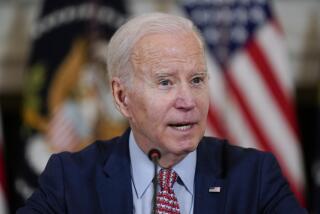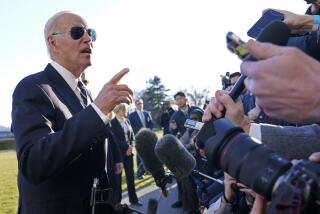Lifting of S. African State of Emergency Draws Praise, Criticism : Apartheid: Foreign leaders applaud the move, while a black union demands that Natal province be included.
- Share via
JOHANNESBURG, South Africa — The four-year-old state of emergency was lifted Friday everywhere in South Africa except in a region torn by black factional fighting, and a black union demanded that the emergency be ended there too.
Praise poured in from around the world in the wake of President Frederik W. de Klerk’s announcement Thursday in Parliament that a sweeping nationwide state of emergency would lapse at midnight Friday in three of South Africa’s four provinces.
Britain, France, the United States and the United Nations praised the decision to restore civil rights denied for four years.
But Nelson Mandela’s African National Congress said the action did not go far enough. ANC spokesman Walter Sisulu said that De Klerk’s action was a half-measure and not enough to clear the way for ANC-government negotiations on a political settlement between blacks and whites.
The country’s largest black labor federation criticized the government for extending the emergency decree in Natal, saying it is a pretext for police to continue abusing blacks.
“Our experience of the state of emergency in Natal is that it has provided a cover for the security forces . . . to terrorize the people,” said the Congress of South African Trade Unions, which is allied with the African National Congress.
“Retaining the state of emergency in Natal can only worsen the conflict, not resolve it,” the federation said.
De Klerk said he needs emergency powers in Natal, the country’s smallest province lying along the east coast, where rival black groups are locked in a power struggle that has claimed almost 3,000 lives in three years.
“The ordinary law of the land is inadequate to enable the government to ensure the safety of the public and to maintain public order,” he said Friday, in an order reimposing emergency rule in Natal for 12 months.
The new rules were milder than the full emergency imposed nationwide by then-President Pieter W. Botha on June 12, 1986.
They include the power to detain people without trial, but do not renew press censorship, the banning of opposition groups, or sweeping police authority to seal off a so-called unrest area to reporters and civilian monitors.
The decision to retain emergency powers in Natal was taken during a five-hour Cabinet meeting Wednesday in Cape Town.
Government sources said De Klerk had wanted to scrap emergency rule countrywide and depend on other far-reaching security laws to contain internecine black violence and black opposition to white rule.
One source said De Klerk conceded reluctantly after Law and Order Minister Adriaan Vlok put forward a police report about the unrelenting violence in Natal.
The pro-apartheid Conservative Party said the end of the state of emergency in Cape, Transvaal and Orange Free State provinces would lead to chaos and further alienate right-wing whites disgruntled with De Klerk’s reforms.
Conservative leader Andries Treurnicht said the government should have required the ANC to renounce its armed struggle against apartheid before the state of emergency was lifted.
But leading newspapers praised De Klerk’s decision.
The Cape Times said the action will have “a steadying effect at home, while once more demonstrating to the world (De Klerk’s) firm commitment to a negotiated settlement.”
“Even for the cynics, the lifting of the state of emergency will mean more space, however small, has been cleared for political activity,” said the Sowetan, a black-oriented newspaper.
During the emergency, more than 30,000 activists, most of them black, were detained without charge for varying lengths of time. About 300 were being held under the emergency regulations as of Friday, most of them in Natal.
More to Read
Sign up for Essential California
The most important California stories and recommendations in your inbox every morning.
You may occasionally receive promotional content from the Los Angeles Times.










